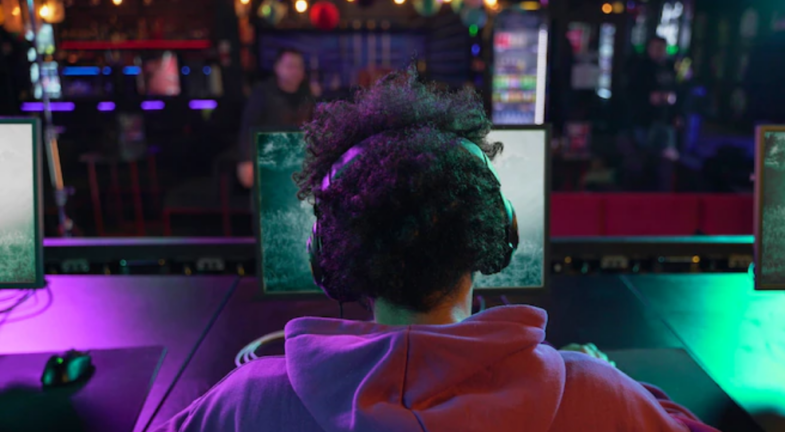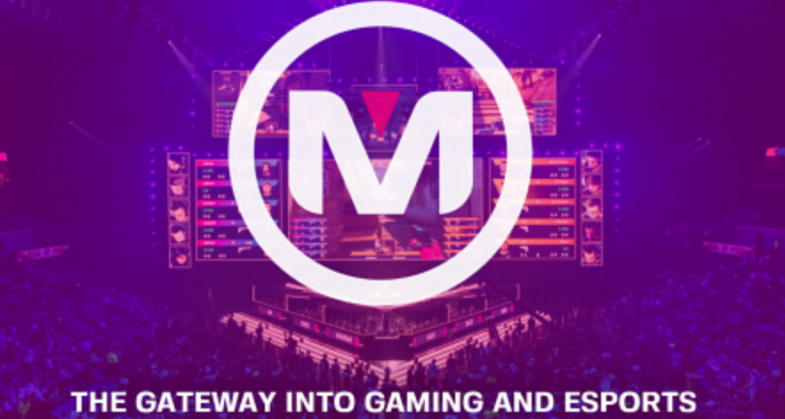The gaming industry is booming. Expected to surpass around $200 billion USD in global revenue in 2024, and with an forecasted growth rate of 13.2% for the foreseeable future, the outreach and growth opportunities for companies investing in gaming are nigh-on limitless.
However, in order to capitalise on the roaring success of the gaming industry, it is paramount that companies understand the importance of building a strong brand.
Moreover, it’s key that they know what goes into a strong brand, and how they themselves can execute a successful branding strategy tailored to the gaming market.
What Makes a Brand?: 7 Key Elements
Branding is far from being solely about a colourful logo and a catchy slogan. Let us begin this article by taking a quick look at the 7 fundamental elements which go into making a strong brand.
1. Simplicity

Source: freepik.com
The most successful branding in the world – think of the likes of Nike, Coca-Cola, KFC, Huel, and McDonalds – is extremely simple.
The message of the brand is simple; the logo, colours and slogan are simple; the service(s) which the brand offers is simple to understand, and the means of accessing that brand’s products and service is also simple.
When building a brand, you want to boil down all of your considerations – from the goal at the core of your business to your colour palette and business structure – to their most concentrated, and thus effective, forms.
2. Authenticity
Another key tenet of successful branding is to be authentic. We’ll discuss in greater detail the importance of this in the next section, but suffice it to say that consumers of the 21st century want more than anything to be able to trust the brands they are interacting with.
As such, when you establish your branding you want to consider who your ideal patron is, and which elements of your authentic self (the authentic identity of the business) that potential patron would relate to.
Identify your most authentic narrative and promote this, it is your greatest strength.
3. Familiarity

Source: freepik.com
Linked directly to the authenticity of your branding is its familiarity to the customer. A successful piece of branding naturally sticks in the mind of the customer. Yet branding with true staying power goes even further; it feels familiar to the consumer on an intimate level.
The person engaging with this type of branding feels as if they already know exactly what the brand is about, who the kind of people that work there are, and that they can probably trust the products and services the brand provides.
Obviously, building this type of branding is not easy – it takes a great deal of market research, combined with extensive introspection and experimentation, in order to establish a look, voice, identity and message with which a customer will already feel familiar.
Doing so, however, is worthwhile: familiarity breeds comfort; comfort, trust; and trust equals brand loyalty.
4. Core
A brand, like a person, must have a reason for being. The stronger, more nuanced and genuine (or authentic) that reason for being, the stronger the brand is, for this reason is ostensibly the core – or heart – of a brand.
It simply is not enough for your reason for being to be something like “making money”, “getting famous”, or the like. These ideas are not in any way original, and do not resonate with customers – in fact, they are more likely to do the opposite.
Important to note is this: your ‘core’ is not something which will typically be externally presented in customer-facing branding. Instead, it is like a beating heart, keeping you and your employees focused, motivated, and passionate about achieving the goals of the company.
Examples of successful branding cores may look like this:
- To make sustainable, eco-friendly clothing which evolves with fashion trends yet remains relevant for a lifetime.
- To improve the sporting performance, safety and enjoyment of athletes competing in the game of rugby at all levels.
- To create an inclusive, equitable, decentralised metaverse in which gamers can interact with like-minded individuals whilst playing games which develop their interpersonal communication skills.
5. Identity

Source: freepik.com
‘Identity’ is the element to branding which most lay-people associate with the term ‘brand’.
A brand’s identity is its outward appearance; what customers see when they interact (actively or passively) with your brand.
Whilst each of the 4 different elements we’ve talked about so far are equally important to the strength of your brand, here is where you summarise these elements into one cohesive look and feel.
Building a brand identity is, to borrow an analogy from the gaming industry, a little like building your starting character in an RPG.
You want the look you design for your brand to say, without words, as much about your brand’s raison d’être, products, services, and ethics as possible; both as quickly and as simply as possible. At the same time, a brand’s identity must also be as memorable and recognisable as possible, too.
This is a big task, of course, but not an impossible one. Take the Nike ‘Swoosh’, for example – the shape, dynamism and simple two-tone colour palette of Nike branding not only sticks in the mind, it also suggests movement, action, and ultimately, sport.
6. Voice
The voice of a brand is another key element to branding. Voice could quite literally be a voice: a spokesperson (like Elon Musk for Tesla) who comes to represent the brand and thus be associated with the messages being put across. Equally, ‘voice’ doesn’t have to have anything to do with the spoken word.
Instead, your voice is tied inextricably to your brand’s identity. With your brand voice, you must communicate the ethics of your brand.
Here’s where the ‘core’ comes back into play – ask yourself these questions: What do you stand for, and how is that reflected in what you do? What are your brand’s position on big global questions like sustainability, climate change, EDI (equality, diversity and inclusion), and so on?
Once you have come to understand the voice of your brand, you can begin to communicate it through slogans, taglines, and the products and services you develop; as well as through your branding and marketing campaigns, and the platforms you promote them on.
Just remember: keep your brand’s message simple, snappy, memorable and authentic.
7. Strategy

Source: freepik.com
Text – plan for the implementation of the brand through all departments
Last but most certainly not least, a strong brand requires a strong branding strategy. There are two core elements to a strong brand strategy:
1. Internal: Implementing the elements of your branding throughout all departments of your business, from R&D and product manufacturing, to sales and marketing, and even within finance, recruitment (HR), and through the entire structure of your business.
For example, if one of the core tenets of your branding is inclusivity and equality, then the structure of your business, your hiring practices, your marketing campaigns, and the types of products and services you design should all echo these tenets.
2. External: Showcasing the elements of your branding through marketing campaigns which utilise your colours, logos, and slogans to reach the target demographic around which these elements have been developed.
It is crucial that in external brand strategizing you promote your brand on the platforms, and through the mediums, which your target demographic favours.
In gaming, this means utilising content creators and gaming influencers, eSports team sponsorship, in-game advertising, and social media platforms like Discord and Reddit.
Why Is It Important to Build a Strong Brand?: 6 Reasons
Almost a majority of the entire world’s population is considered gamers, meaning that avenues for market expansion are many, and almost any target demographic can be reached through a carefully-executed brand and marketing strategy.
Let’s take a look at the 6 major reasons you should invest time and resources into building a strong brand for the gaming industry.
The consumer has more choice than ever
With the advent and evolution of the internet has come an unprecedented explosion in the avenues available to marketers and brands.
On the one hand, this is a good thing: it levels the playing field and allows for brands to reach more potential customers and clients than ever before.
On the other hand, it presents a significant challenge: the consumer now has more choice than ever, and you have more competition.
A strong brand becomes incredibly important in this type of environment. Strong branding helps your voice to be heard, and for you to stand out from the crowd.
It aims to build trust – and with trust, loyalty – in consumers so that instead of trawling the internet in search of a product or service provider who suits their needs and ethics, they know instead to come directly to you.
The consumer cares more about ethics and identity than ever

Source: freepik.com
With digital literacy has also come exposure to the many flaws inherent in the capitalist system, especially in a world besieged, like ours, by climate crisis, inequality, and breaches of worker rights.
Countless studies and polls have shown that today’s consumer cares deeply about the ethics of a brand, and are more likely to stay loyal to a brand if the consumer feels said brand echoes their own existing ethics, politics, and overall outlook on life.
At the same time, remember that it is key you remain authentic as a brand. Consumers can see straight through branding which attempts to pander to them. However, strong branding which speaks from the heart and implements its ‘core’ ethics throughout its business and business structure has a high chance of attracting loyal customers who will stick around for the long haul.
Increased recognition and the cognitive feedback loop
Once again relating to the internet – upon which the gaming industry depends in order to continue growing at such an extraordinary rate – is the fact that consumers are presented on a daily basis with more content than they can ever hope to properly process.
In order for a brand to succeed in attracting customers and staying relevant, its branding must be strong enough to create a cognitive feedback loop.
In such a loop, a content consumer would first be able to quickly recognise a company based on the branding of its advertisements and products.
Following recognition, the branding should be strong enough that each time the consumer sees it, recognition of the brand’s status and authority within a particular niche is reinforced. Finally, the cognitive feedback loop is cemented: when the consumer thinks of a particular niche, product or service, they think of your brand.
The creation of this loop leads to increased brand awareness, reach, and ultimately, sales and loyalty.
Higher brand equity presents greater opportunities

Source: freepik.com
The next reason behind the importance of strong branding is linked directly to the previous point regarding recognition and the cognitive loop.
The stronger a brand is, the more it is able to establish itself as an authority within its field, and the higher quality a consumer perceives its goods and services to be.
The psychology is simple, when presented with two competing brands – one whose branding is strong, simple, authentic and memorable, versus one whose branding has been less thought-through, or which lacks authenticity and originality – the consumer will choose to interact with the brand whose branding is stronger (i.e. the former of these two examples).
Once you achieve a perception of higher brand equity (in other words, quality), you open the door to opportunities such as:
- Increased company stock price
- A justifiable increase in the price of your products and services
- Diversification of your product and service portfolio
- Branding improves the quality of your advertising
- Text – better visuals, clearer message, more consistent look and feel
In attracting potential customers, advertising is still the name of the game. Yet, as we’ve highlighted, creating advertising which can stand out from the rest of the crowd – or be heard above the noise – requires strong branding. Thankfully, strong branding lends itself to a higher quality of advert.
With carefully considered and implemented brand identity, voice, authenticity and strategy, you have at your disposal an instantly recognisable logo, slogan, colour palette and message with which consumers can relate and trust. These elements can then be used ad infinitum throughout any number of marketing and advertising campaigns.
Quality branding attracts quality employees
Every company wants to attract the strongest talent to its shores, in order to set and achieve ever-greater goals. Attracting the very best employees to your team, however, can be just as competitive as standing out from the crowd when appealing to consumers.
Quality branding is fundamental to the growth and improvement of a business’s workforce. Just as strong branding attracts loyal customers who feel they can relate to that business’s ethics, products, services and aesthetic, so too can branding attract talent to your team.
Employees who feel passionate about a brand’s core message and ethics, as well as about the products and services that brand offers, and the structure of the company behind it, will work harder and more efficiently than employees who don’t respect or particularly like their employer.
How to Implement a Strong Brand Strategy in the Gaming Industry: 4 Tips

Source: freepik.com
We’ve explored the 7 key elements which comprise a strong brand. We’ve also examined the 6 top reasons a strong brand is important, not only in this day and age, but with a specific focus on the gaming industry.
Let us close this article with a brief look at the 4 best pieces of advice when it comes to implementing a strong brand strategy in gaming.
Invest time and resources into establishing your key brand elements
Creating a strong brand is not an overnight process. It is a constantly evolving journey of self-evaluation and change, and it requires sufficient time and resources to be successful.
Don’t scrimp on the time, money and people-power you invest in the development of your brand. Put in the work early doors, and you’ll find it pays dividends down the line.
Break free of the assumptions surrounding the “average gamer”

Source: freepik.com
Time was, you said the word “gamer” and thought of nerdy teenagers sitting alone in their bedrooms. Now it is time to dispense with this outdated narrative. The “average gamer” today could, realistically, be anyone
In terms of age, the average gamer is 35 – far older, and with far more purchasing power – than any teenager.
Around 40% of the entire world’s population alive today can be considered a gamer of some sorts – whether they play Candy Crush on their smartphones, watch content creators livestreaming on Twitch, or actively play Xbox or PlayStation games with their friends.
For brands interested in marketing in the gaming industry, this means that virtually any target demographic they wish to reach can be reached.
Thus, when implementing your brand strategy, it’s important to think outside the box and break free of the stereotypes historically associated with “gamers”.
Utilise micro-influencers whose audience are your target demographic
Twitch – a gaming-dedicated (yet expanding) streaming platform – is one of the world’s most popular platforms for sharing and consuming content. Of the hundreds of thousands of streamers on Twitch, at least 10,000 of them are full-time influencers with audiences comprising diverse demographics. There are even more influencers who attract smaller, so-called “micro”, audiences.
Micro-influencers have built a loyal following who trust and relate to them. When it comes to micro-influencer marketing campaigns, these creators have higher conversion rates often even than major celebrities and other mega-influencers do, meaning that advertisers get more bang for their buck when investing in them.
There are numerous avenues your brand can explore when interacting with micro-influencers, and others in the gaming industry, like eSports teams. These include:
- Ad-hosting
- Affiliate marketing
- Product placement and reviews
- Outright sponsorship
- Featured GamePlay
Engage the expertise of dedicated gaming and esports marketing agencies
One of the simplest and most effective – in terms of both cost and return – ways to build your brand from the ground-up, and then implement that brand through marketing strategies tailored to the gaming industry, is to employ the expertise of those who have already accumulated over 14 years of experience in the field.
Here at Mindfuture, our team of brand and marketing specialists are experts at connecting brands (many of whom would previously have had nothing to do with gaming) to the most relevant and successful gaming influencers and content creators, in order to convert on their marketing goals and KPIs.
Mindfuture offers a host of services – including digital marketing, brand strategy, merchandising and events – to a portfolio of clients ranging from Coca-Cola and KFC, to HyperX, Sennheiser, Razer and Betway.
If you’re interested in building a strong brand to attract customers and clients from throughout the gaming industry, then simply contact Mindfuture today to learn more.
Key Takeaways: Building a Strong Brand for the Gaming Industry
Building a strong brand is absolutely fundamental to the success of your company, especially in today’s highly-competitive and noisy digital content environment. Here’s a final look at our key takeaways from this article.
- A brand is about so much more than just a cool logo, colour palette and catchphrase.
- The strongest brands search deep inside themselves to determine their authentic selves.
- Brand implementation should take into account all of a company’s various departments.
- Consumers today care about brand ethics, identity and voice more than ever before.
- To catch a consumer’s eye and hold their attention, simplicity and message are key.
- “Gamers” are no longer lonely teens, they are – in effect – anyone and everyone.
- To build a strong brand from scratch, implement it via an effective strategy, and market it to a range of target demographics through the influencer arena of gaming, choose a trustworthy and experienced gaming and eSports marketing agency like Mindfuture.


